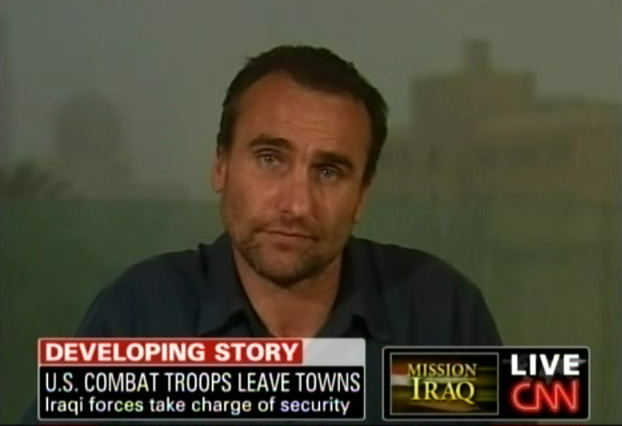NR: "It's all against a backdrop of an ongoing al Qaeda in Iraq-inspired bombing campaign."
June 30, 2009

Length: 3:29
LARGE (40.4 MB) ----- SMALL (4.3 MB)
As dusk falls on 'Day One,' Michael reports on another car-bombing in Kirkuk targeting a market, killing women and children in another attempt to fire up the sectarian violence.
TONY HARRIS, CNN ANCHOR: First, this hour, a turning point in Iraq. Six years and three months after the U.S. invasion, American troops are out of Iraq's major cities, leaving Iraqi forces in charge of security. We have CNN's Michael Ware in Baghdad, and our Barbara Starr's at the Pentagon for us. Michael, let's start with you. How are Iraqis handling this milestone?
MICHAEL WARE, CNN CORRESPONDENT: Well, the initial outpouring has been one of celebration, jubilation, celebrations in parks, formal ceremonies. Clearly being marked on state TV, a font that's been marking the countdown to the handover, TV anchors in Iraqi flags.
However, all of this sense of joy has been underpinned by a natural sense of apprehension. The Iraqis know how fragile their security forces are. And if ever they needed a reminder, it's some tragedy to report that just a few hours ago, at dusk here in Iraq, another car bombing has gone off, this time in the northern city of Kirkuk. It detonated in a crowded marketplace. And reports we're getting from Kurdish officials is that so far, the death toll stands at 25 and that as many as 54 people have been wounded. What we're being told is that many of them are women and children because the bomber has struck, as we've seen so many times before, at the peak shopping period in the center of a crowded market.
HARRIS: And Michael, we have tried as best we could to get a view of life for Iraqis in their cities. I'm just curious, given all your time there, how are things changing on the ground for people who live in Iraq's major cities?
WARE: Well, there's two things I'd say first offhand. One is the absence now of U.S. troops.
We've seen this occurring throughout the year as brigade after infantry brigade has been pulled back to prearranged or pre-approved bases outside of the major cities and towns. These are bases that have been chosen by the Iraqi government and by Washington.
The other change is that, in relative terms -- as I said, we just had a bombing in a northern city. We've already had a double roadside bombing here in Baghdad that only wounded four civilians. But in terms of Iraq, relatively speaking, that has been a form of stability. So, we're seeing some return to life. Certainly from my last trip, many months ago, to this trip now, there's a different air in the city. People are moving about more than they used to. There is some greater sense of freedom.
Some of the blast walls have come down, but there's still Iraqi checkpoints aplenty, army, police, national police. But the Americans have stepped way, way back. Things are starting to loosen up, but it's all against a backdrop of an ongoing al Qaeda in Iraq-inspired bombing campaign.
HARRIS: All right. Michael Ware in Baghdad for us.
Pretty visual stuff there, Michael. Appreciate it. Thank you.
